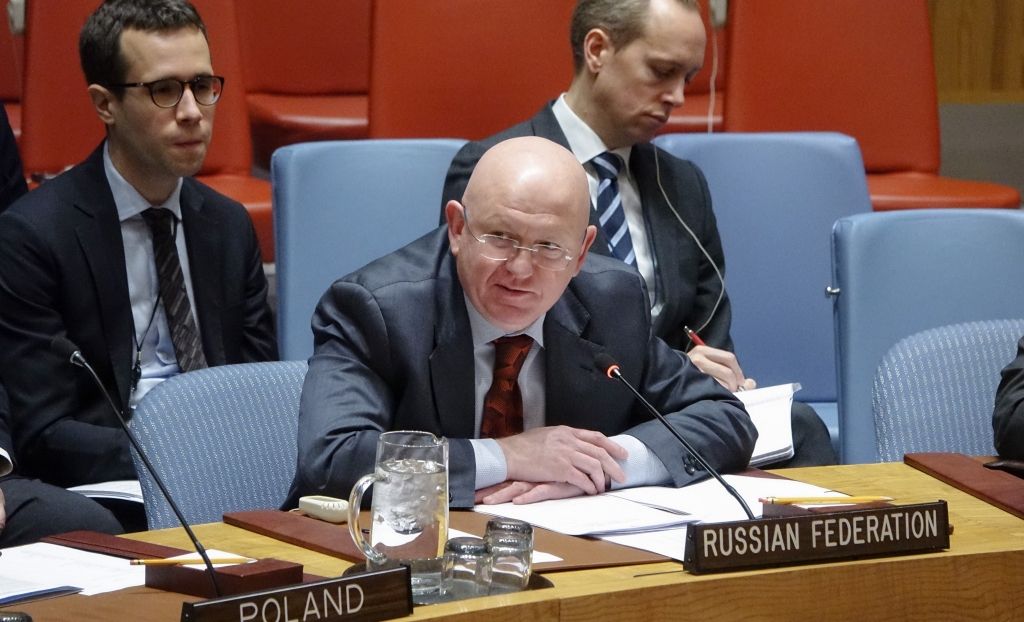Statement by Ambassador Vassily A. Nebenzia, Permanent Representative of the Russian Federation to the United Nations, at the Security Council meeting on the Security Council working methods
I would like to begin by welcoming our new colleague, Ambassador Ma Zhaoxu, Permanent Representative of the People’s Republic of China. Unfortunately, he is not here. Needless to say, our greetings will be conveyed to him and we want to congratulate him on his new appointment and wish him every success in his work.
We would like to commend Mr. Martin for his very interesting and in many ways very accurate briefing, and to thank the delegation of Kuwait for organizing today’s meeting. For many years now the Security Council been discussing the question of its working methods in an open format with the broad participation of States Members of the United Nations.
Taking a periodic inventory of our working-methods arsenal helps us to identify the various areas where there is room for the improvement of the Council’s working practices. We would like to highlight last year’s update of the note by the President of the Security Council contained in the annex to document S/2017/507, produced under the leadership of the Japanese delegation, which chaired the Informal Working Group on Documentation and Other Procedural Questions.
It is an important compendium of the working practices of the Security Council and extremely helpful for both the permanent and non-permanent members. It is significant that today’s meeting is being presided over by the delegation that now chairs the Informal Working Group. We are sure that today’s meeting will help to enrich this body’s activity with new ideas.
Needless to say, that is on the understanding that any steps to improve working methods must be taken only by the Security Council itself, in accordance with Article 30 of the Charter of the United Nations. The issue of the Council’s working methods is a very sensitive one. The purpose of making changes to them should be to increase the Security Council’s effectiveness and efficiency in implementing its task of maintaining international peace and security. Embracing populism, including in the context of the never-ending efforts to increase the level of transparency in the Council’s work, is not always helpful.
Transparency is important for ensuring that United Nations Members and the world community are broadly familiar with the Council’s work, but it should not become an obstacle to frank and substantive discussions among Council members. We have serious reservations about the practice of considering thematic subjects in the Council, especially those that come under the remit of the General Assembly, the Economic and Social Council or other United Nations bodies, in accordance with the Charter. It violates the established division of labour and distracts the Security Council from its priority tasks, on which it can and should take concrete decisions.
We support expanding the Council’s coordination with a wide range of Member States and with those that can provide it with information vital to decision-making. For that the Council has various appropriate mechanisms in its arsenal, including informal Arria Formula meetings and interactive dialogues. However, we will not tolerate turning such meetings into propaganda performances, and we urge that they be used specifically to raise members’ awareness on issues on the Council’s agenda.
We welcome the fact that the Kuwait presidency has asked Member States for suggestions for further modernizing and democratizing the Council’s work. In our view, we should take a closer look at the distribution of responsibilities for the informal oversight of the Council’s various dossiers. Being a penholder is an additional responsibility, and those carrying out that function have to act impartially and respectfully, keeping a constant finger on the pulse of the events in the countries concerned. Inactivity on the part of some penholders has often resulted in the serious deterioration of situations and the emergence of so-called forgotten crises.
We should expand the circle of penholders and do so particularly by using non-permanent members. We would like to tackle this issue seriously within the relevant working group. The methodology for negotiating Security Council resolutions needs improvement. Recent situations that have arisen when work has been done in a high-pressure atmosphere of artificial deadlines, precluding thorough study of the relevant documents, are unacceptable.
What we end up with is half-baked documents that do not take into account the concerns of all Council members, who should be participants in the negotiation of draft decisions and resolutions at every stage of the work. Another issue of concern that the Working Group should address is attempts to arbitrarily interpret the formats for considering regional situations.
In that regard we should be guided not by national preferences — often phobias, actually — but by the real state of affairs in hotspots. As we have already noted, we should be working constantly to improve the Council’s working methods. However, those efforts can be genuinely effective only when Council members reject politicized approaches and choose concerted efforts on a basis of mutual respect for each other’s concerns and priorities.
I would also like to mention, since the subject has come up, that the right to the veto does not come under the category of the Council’s working methods. It is rather a cornerstone of the entire architecture of the Security Council, not a privilege but an instrument pledging and guaranteeing the Council’s ability to reach balanced decisions, which are the only decisions that have a high likelihood of being fulfilled as effectively as possible.
